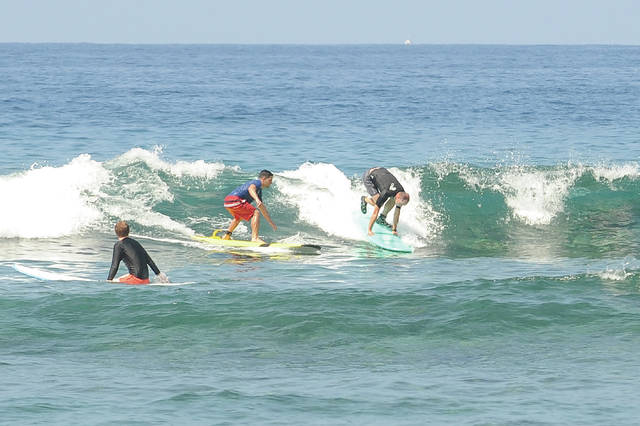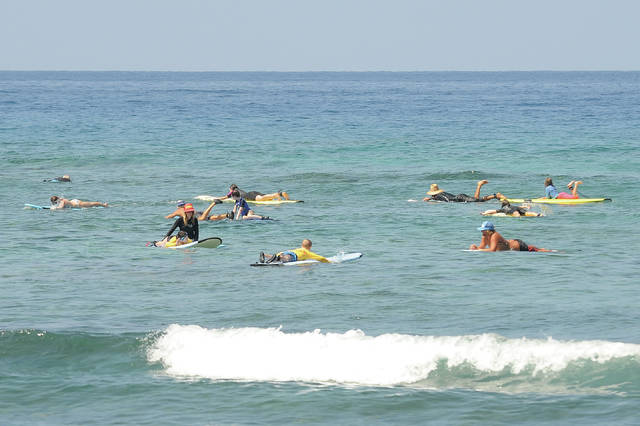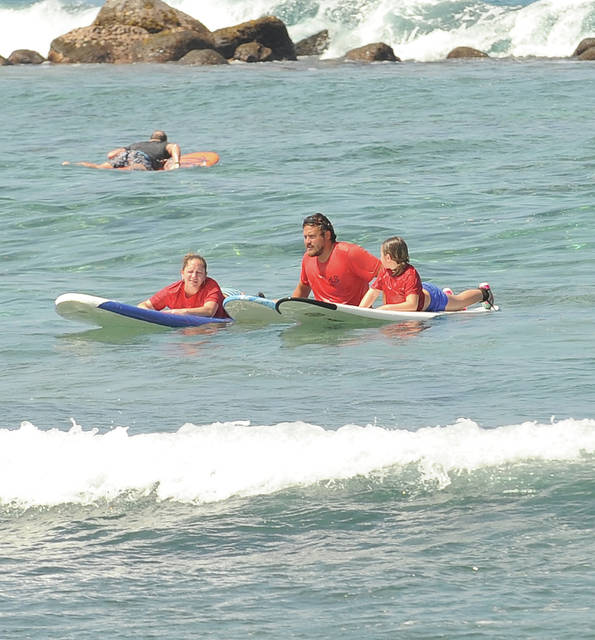KAILUA-KONA — The Kohala Center is moving forward again with plans to limit surf school operations at Kahaluu Bay, but local business owners say they still aren’t satisfied with what the nonprofit has planned for the popular surf spot, taking issues with fundamental components of the proposed management program.
Cindi Punihaole, director of the Kahaluu Bay Education Center, a project of The Kohala Center, meanwhile said the organization doesn’t plan to hold any more meetings before the new bid submission deadline of March 27 at 2 p.m.
The Kohala Center was selected through a separate bid process to manage a program that would limit surf school operations at the bay to just four businesses. The concessionaires will be selected through a competitive bidding process. The new deadline comes after the county postponed an earlier Feb. 20 deadline following strong pushback to the original proposal.
And while an addendum released Monday addresses some of the concerns raised, it doesn’t change the fundamental problems some had with the proposal — specifically limiting use of the bay and charging surf schools a minimum $3,000 a month to do business there.
“A lot of us still cannot afford that,” said Wesley Moore, owner of Kona Town Surf Adventures.
Moore said he understands the need for some sort of regulation at Kahaluu, but has strong reservations about how the program and fee would impact small businesses like his own.
Punihaole said they’re looking at the program as a pilot project with a six-month timeline. In her view, the important thing is to get a program off the ground and make adjustments as it goes along.
“So it would be like a work in progress,” she said.
As a pilot program, she said, the fundamentals will remain the same: four surf schools will be permitted to operate at the bay with a minimum monthly fee of $3,000.
But for some local surf schools, those fundamentals are also the fundamental problem with the proposal.
Capt. Rick Green, who has been the sole owner of Hawaii Lifeguard Surf Instructors for the past 20 years, said any proposal that restricts businesses from using the water is a nonstarter, saying The Kohala Center was monopolizing the bay by implementing a limit.
Green said his big concern is making sure businesses operating at the bay are properly licensed and certified, something he said has never been enforced.
He said there were many good alternative ideas brought up from the community, including one from the Hawaii Fire Department’s ocean safety division captain, who suggested grandfathering all surf schools already in business and granting a permit to those actively running schools.
An owner would lose the permit if they didn’t pass the business on to a direct descendant, thereby reducing surf school activity at the bay over time.
The idea received much applause at a community meeting, but Green said it seems like it went completely ignored, which he said was like “a slap in the face.”
Under its agreement with the county, The Kohala Center is required to create and manage an advisory board, which Punihaole said would oversee the program and make adjustments along the way, rather than waiting until the six months are up.
Punihaole said she would like the advisory board to meet once a month or as needed.
She also wants to use the six-month period to create standard operating procedures, “so at the end of six months, you already have a foundation built.”
Over a course of a year and assuming each of the four permitted surf schools was paying the minimum $3,000 a month, the monthly fees would generate $144,000 for the program, which Punihaole said was the minimum budget she could develop for the program.
Under the program, the fees would pay for a full-time and part-time education ranger as well as a supervisor. That, she said, is the minimum needed to have someone at the beach throughout the week.
But Moore said any plan that forces surf schools to put up $3,000 a month is “taking a good chunk of change out of local businesses.”
“I want to see something done,” he said, “but not at the expense of the surf schools.”
The $3,000 monthly fee, which is merely the minimum bid to even be considered as a concessionaire, would already be a burden on his business, and the effect would be compounded in the off season.
“You’re asking small, local businesses to pay $3,000 a month, when there’s months we don’t even make that,” Moore said.
Green agreed.
“They want a portion of my business and I receive nothing in return,” he said.
The education rangers wouldn’t have enforcement authority, but would be able to ensure rules are being followed. If an unpermitted school is found operating, Punihaole said for example, a ranger could advise the school about the rules and the school could take its classes elsewhere.
She noted the Hawaii Police Department and Department of Land and Natural Resources enforcement branch both have a presence on the advisory board, giving the program a direct conduit to law enforcement.
While the program itself will be changing and evolving, Punihaole said she wants the surf schools to be confident that they are getting what they are paying for.
“If the surf schools are going to pay,” she said, “they should expect the best service.”
And if she finds a better way to accomplish the program’s goals or a way to do it with less manpower, she’ll pursue it.
Green said he doesn’t plan to take part in the bid, saying he plans to present a petition with more than 1,500 signatures to the mayor and local officials.
That petition urges the county to cancel the concessions program.
Moore meanwhile said he’s still on the fence about submitting a bid.











Just another way to punish good business people that play by the rules.
Maybe Hawaii should just pass an all encompassing law that makes it illegal to work for anyone except the government or a non profit funded by the government. This way we could all just be subservient to the politicians or we could be homeless and dependent and on welfare so the government can feel needed.
A minimum of $3,000 a month to use the ocean really?
Just to be sure here, 4 companies have to bid to use a public resource with the minimum bid being 3K per month, the highest 4 bids get access to our ocean. The KOHALA Center somehow became the entity getting these funds and will hire an employee or two . These employees have no legal authority, but will be able to “ensure that rules are being followed” and let non bid winning companies know that they can’t give lessons and that they should go somewhere else. While something should be done to limit the commercializing of our waves at Kahaluu , this plan seems doomed to fail. The Lifeguards’ comments should be given some thought perhaps.
“Under the program, the fees would pay for a full-time and part-time education ranger as well as a supervisor. That, she said, is the minimum needed to have someone at the beach throughout the week.’ Three paid positions just to regulate 4 surf schools? And they really have zero authority? Sounds like they’re trying to fund their reef program and came up with a great way to have someone else pay for it.
Just get rid of the illegal schools and the problem is solved. Oh but wait, how will they fund the reef program?
You think? From the get go .
“a minimum $3,000 a month to do business there” REALLY seems a bit over the top. I bet it eliminates most of the businesses and if they were to pay that amount would end up with 5 bucks in their pocket. Seems like this is another BoonDoggle to get someones family member the Monopoly on the business?
Education Ranger with No enforcement power? The problem is that the DLNR and the Police are not already enforcing the existing rules. Signs clearly say “No Commercial Activity”, both the DLNR and Police drive by daily and do nothing. This is doomed to failure unless both of those agencies step up and do the job.
Have you ever considered whether those signs refer to no commercial activities on the road, shoulder, right of way, County of Hawaii Parks and Rec lands (the beach park) or State of Hawaii Ocean Waters ( yes,that is correct, those waters are not part of the county beach park). If I own a commercial business across Alii Dr. and I rent a stand up paddle to a tourist to use in the bay, I would not be conducting commercial activity in the bay, nor would the tourist. Same scenario, but in a van next to that sign; this businessman would be operating contrary to law on the shoulder .HPD better have some good witnesses willing to testify or video evidence .There is not a violation of law in the ocean waters by the businessman nor the tourist. Enforcement ain’t easy, nor is prosecution. these Ranger Enforcers must, absolutely, be required to testify . I can go on and on. Good luck with this one Harry.
Some of the “illegal” schools park on the road shoulder, set up bench’s and then use the guardrail for their boards. They are conducting business directly under the No Commercial Activity signs. That would appear to be illegal and fairly easy to cite and enforce.
Yes. Exactly as I stated as to a van parked on the shoulder. Citation as an enforcement action may be easy. Getting a conviction of “unpermitted or illegal commercial activity” is not “fairly easy”. Proof. Drop dead evidence of course is the tourist testifying. Guess what? That tourist is back in Ames when a court date comes up. Just because a guy has boards leaned up on the guard rail and ads on the van does not get a conviction. Business owners, well its their bread and butter, sometimes they’ll just pay the fine and shine it on and continue with their ways. Seizing of evidence (vehicle, boards, etc) is what makes them stop. That needs a conviction in court, but HPD holding the seized items until that court date, win or lose, sometimes is effective.
Surfing is a true independent sport. No one wants to see a surf spot mobbed by a gaggle of beginners who are a danger to themselves and other surfers. Adding to this is the selfishness and greed of those who would use public resources for their own personal gain.
Just like any crowded place in nature (oceans included)..you need strict regulations/enforcement or the place goes to complete shite thanks to inconsiderate human behavior.
So the schools have to fund three positions, which in turn still have no authority to solve the problem? Am I missing something?
The best solution is just to ban them from the water completely , no commercial activity in the waters of Kahaluu bay . Just like no boats , kayaks or commercial vessels are allowed in the bay that is the best thing for us the public . That is our park and bay . The surf board ride sellers are the ones who asked for there to be four permits for the park themselves as there are DLNR rules that will be enforced and the No Commercial Activity rule will be enhanced to remove them from the roadside . They will enter from the safe beach not the dangerous slippery rocks that are just waiting for a bad fall . Who will pay for that we will as they have no insurance . Lets just have one free of charge set up in the park with no more then 10 boards , I will donate one myself , run as a Kapuna Program where volunteers can come and share their knowledge of the Ocean and Waves with residents and visitors alike . That would be keeping with the Aloha spirit . As of now 70 to 100 percent of the people in the surf area of Kahaluu bay are paying customers of the surf board ride sellers that they shove willy nilly into waves and at the public . We want the Park and Bay back to the good and pleasant place it was before the profiteers ruined the Aloha vibe and the unity of residents and visitors it once had . Remember this is our Park and Bay .